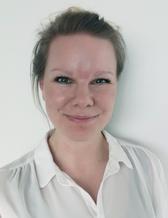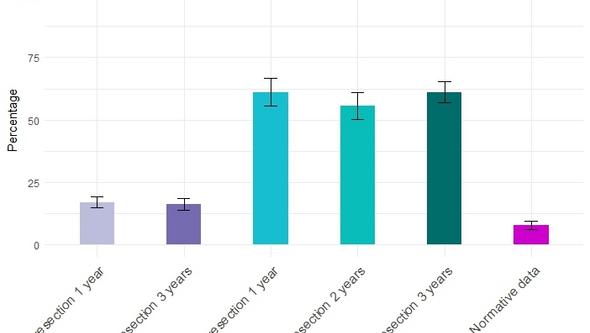
- Home
- Research
- Find research
- Sofia Sandberg: Long-term function after colorectal cancer surgery
Sofia Sandberg: Long-term function after colorectal cancer surgery
Impaired bowel function is common after surgery for colorectal cancer. Sofia Sandberg’s doctoral thesis provides new insights that may contribute to reducing patients’ long-term distress.
SOFIA SANDBERG
Doctoral thesis: Long-term bowel and stoma function following colorectal cancer surgery
Research area: Surgery
Sahlgrenska Academy, The Institute of Clinical Sciences

Colorectal cancer is a prevalent form of cancer. Generally, the prognosis is relatively good, and many patients can be cured or live for a long time with the disease. However, after surgery, where the affected part of the colon or rectum is removed, and the remaining sections are rejoined, bowel function may deteriorate.
Because the rectum, bladder, and internal reproductive organs are closely situated in the pelvis, impaired urinary and sexual function are also common in rectal cancer. For some patients, the bowel ends cannot be reconnected after surgery. These patients then receive a permanent stoma, resulting in a bag attached to the abdomen.
Follow-up after three years
What is your research about?
“I have investigated how bowel and stoma function are affected in the long term after surgery for colorectal cancer and studied the patients’ experience of their bowel and stoma function. We also wanted to identify risk factors for poor function and see which factors affect whether a patient feels bothered or not,” says Sofia Sandberg.
She conducts research at the Institute of Clinical Sciences and is a specialist physician at the colorectal section of the surgical clinic at Sahlgrenska University Hospital.
It is rewarding to conduct research that directly benefits patients
Three of the thesis’s papers are based on two large Danish-Swedish studies of patients with newly diagnosed cancer in the colon or rectum, respectively.
“The patients have been followed up with extensive questionnaires at several time points after their diagnosis. Paper IV is based on the Swedish Colorectal Cancer Registry. In that study, we followed up patients three years after surgery for rectal cancer.”

“Important to address concerns”
What are the most important research findings?
“Our results show that long-term bowel dysfunction is common after surgery for rectal cancer. Although bowel function does not improve over time, patients adapt to their condition. Among the patients who had surgery for colon cancer instead, most had good function. The same applies to most of the patients who had received a permanent stoma,” says Sofia Sandberg.
How can this research benefit patients?
“We clearly saw that what bothers a patient is not solely determined by the actual function. It was also evident that not all symptoms are perceived as bothersome. Hence, addressing concerns and expectations before surgery is crucial. After surgery, early detection and treatment of bothersome symptoms are important., while extensive follow-up is likely unnecessary for satisfied patients.”
“Pleasant research group”
What has been enjoyable and rewarding about the doctoral project?
“It is rewarding to conduct research that directly benefits patients. I feel comfortable and confident discussing with patients about their thoughts on how bowel or stoma function will work after surgery. I have also had the pleasure of being part of a very well-functioning and pleasant research group, SSORG.”
And what has been challenging?
“The individual aspect has been a challenge. I see in our results, and when I meet patients, that what works best for one individual may not be optimal for someone else. And you must be responsive to these differences, so that it becomes as good as possible for each patient.”
Text: Jakob Lundberg